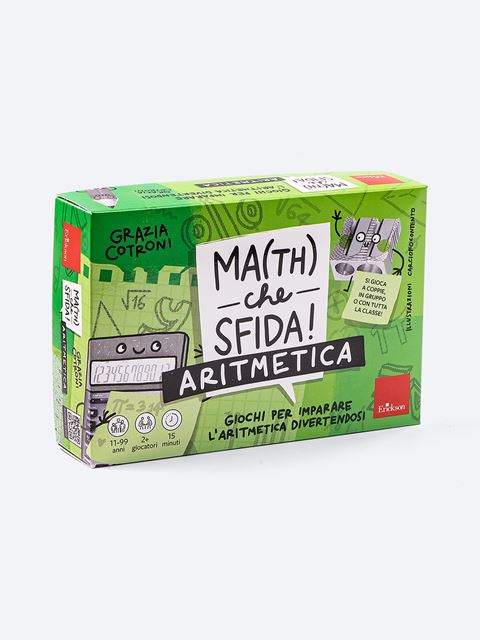 EN
EN
 PT
PT
Games for learning mathematics while having fun

Product: Teaching tools
ISBN: 9788859026570
Publication date: 01/09/2021
Suitable for: Lower secondary 1st level (ages 10-11), Lower secondary 2nd level (ages 12-13)
REQUEST A SAMPLE OR MORE INFORMATION
In a single box, three original games, MATabù, Dominù e D3C1FR4, created to practice and consolidate the main concepts of arithmetic covered in all three years of lower secondary school, through fun classroom challenges.
The playful dynamics of the games proposed in Math, what challenge – Arithmetic facilitates motivation and promotes a stimulating learning environment for the assimilation of contents, in which to train strategic skills and encourage group cooperation.
The didactic objectives
Learning by playing is certainly a fun and never boring methodology to consolidate concepts, in particular, the three games proposed in Math, what a challenge – Arithmetic allow you to:
The games
The four decks of cards contained in the box allow for the playing of 3 different games:
The series Math, what a challenge!
The series Math, what a challenge! was born from the intuition of creating games with a modality similar to the most common ones, practicing the macro-topics upon which the teaching of mathematics in lower secondary school is based: Geometry, Arithmetic and Algebra. Through playful activities, children can recognize what they study in a non-scholastic context, acquiring and understanding it from a new perspective. A stimulus for resuming studies, studying, for reviewing or for a better assimilation of the contents.

Games for learning math while having fun
Grazia Cotroni

Games in a box to train and consolidate the notions of geometry, arithmetics and algebra in lower secondary school and make children the protagonists of the learning process in a new, engaging and exciting way.
THE SERIES
The series Math, What a challenge! was born from the intuition of creating games with similar modalities to the most popular ones, practicing and putting into play Geometry, Arithmetic and Algebra skills from the main topics on which the teaching of mathematics in lower secondary school is based. Through play, children recognize what they study in a non-school context and acquire and understand it in a new perspective. A stimulus for revision, studying, or for a better assimilation of the contents.
THE GAMES
Math, What a Challenge! - Algebra
Three original games in a single box to practice and consolidate the main concepts of algebra in the third year of lower secondary school with fun class challenges. A new way to stimulate students to review and better assimilate content.
The kit is composed of 3 different card games:

Go and Return
Match the largest number of products with their decomposition, or vice versa.
DIDACTIC OBJECTIVES Learn to read algebra and the known products from left to right and vice versa by training to grasp the structure of the formulas Identify any weaknesses or misunderstandings by simulating the exercise together with peers

Decipher
Write algebraic equations read aloud by the other players in the mathematical language.
DIDACTIC OBJECTIVES Acquire mastery of the formal language and recognize its functionality to describe first degree expressions and basic concepts of algebra in a synthetic way

Got-It
Resolve the algebraic equations to eliminate the most numbers possible from your list.
DIDACTIC OBJECTIVES Practice solving first degree equations. Recognize impossible and indeterminate equations.
Leaf through the instruction booklet translated into English.
Math, What a Challenge! - Arithmetics
In a single box, three original games created to practice and consolidate the main concepts of arithmetic covered in all three years of lower secondary school, through fun classroom challenges.
The kit is composed of 3 different card games:

Dominù
The game, similar to classic dominoes, consists of chaining together expressions according to their result, in order to explore the concept of equal and class equivalence and understand how the same number can be represented in different ways.

Decipher
The game consists of writing arithmetic expressions read aloud by another player in mathematical language, in order to master formal language and recognise its use in describing arithmetic expressions of various kinds in a concise manner.

MATabù
The aim of the game is to allow your team to guess as many words as possible, drawn from the pack of cards in a set time, without uttering the forbidden words. The aim is:
Leaf through the instruction booklet translated into English.
Math, What a Challenge! - Geometry
In a single box, two original games to practice and consolidate the geometry notions covered in lower secondary school. Learning by playing is certainly a fun and never boring method to consolidate learning, in the classroom and at home!
The kit is composed of 2 different card games:

Kualè
The game consists of being the first to discover the card chosen by the opposing team by asking the players questions that can only be answered with YES or NO. The cards represent geometric figures. The figures can be concave or convex, regular or irregular, they can have parallel sides, they can have congruent angles, they can be polygons or non-polygons.

MATabù
The aim of the game is to allow your team to guess as many words as possible, drawn from the deck of cards within a set time, without saying the forbidden words. The words to guess are mathematical concepts chosen from Euclidean geometry, in particular angles, triangles and quadrilaterals.
Leaf through the instruction booklet translated into English.
THE EDUCATIONAL OBJECTIVES
Learning by playing is definitely a fun and never boring method to consolidate some concepts, the games proposed in Math, What a challenge! allow students to:
THE AUTHOR
Grazia Cotroni is a Mathematics and Physics Teacher in secondary school. Since 2009 she has been in charge of the Bottega di Matematica with the DIESSE Association, she is a trainer on the topic of didactic innovation.